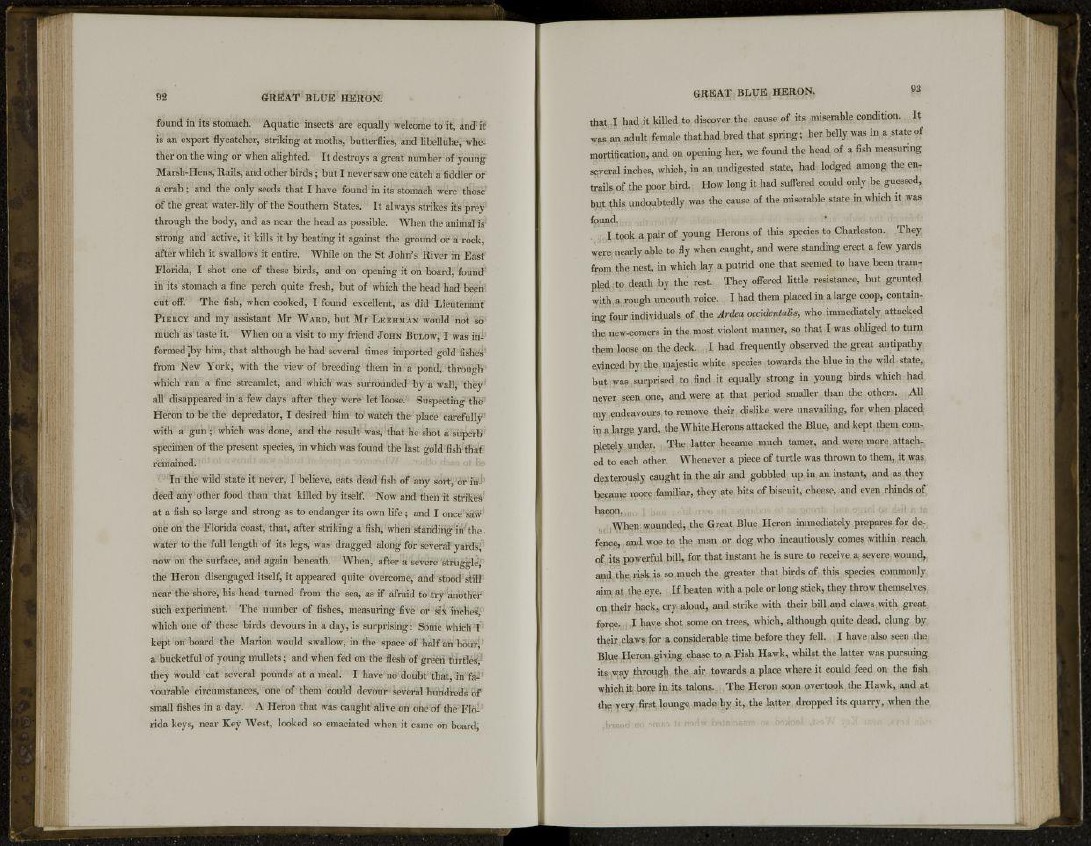
found in its stomach. Aquatic insects are equally welcome to it, and it
is an expert flycatcher, striking at moths, butterflies, and libellulse, whether
on the wing or when alighted. It destroys a great number of young
Marsh-Hens, Rails, and other birds ; but I never saw one catch a fiddler or
a crab ; and the only seeds that I have found in its stomach were those
of the great water-lily of the Southern States. It always strikes its prey
through the body, and as near the head as possible. When the animal is
strong and active, it kills it by beating it against the ground or a rock,
after which it swallows it entire. While on the St John's River in East
Florida, I shot one of these birds, and on opening it on board, found
in its stomach a fine perch quite fresh, but of which the head had been
cut off. The fish, when cooked, I found excellent, as did Lieutenant
PIEIICY and my assistant Mr WARD, but Mr LEEHMAN would not so
much as taste it. When on a visit to my friend JOHN BULOW, I was informed
"by him, that although he had several times imported gold fishes
from New York, with the view of breeding them in a pond, through
which ran a fine streamlet, and which was surrounded by a wall, they
all disappeared in a few days after they were let loose. Suspecting the
Heron to be the depredator, I desired him to watch the place carefully
with a gun ; which was done, and the result was, that he shot a superb
specimen of the present species, in which was found the last gold fish that
remained.
In the wild state it never, I believe, eats dead fish of any sort, or indeed
any other food than that killed by itself. Now and then it strikes
at a fish so large and strong as to endanger its own life ; and I once saw
one on the Florida coast, that, after striking a fish, when standing in the
water to the full length of its legs, was dragged along for several yards,
now on the surface, and again beneath. When, after a severe struggle,
the Heron disengaged itself, it appeared quite overcome, and stood still
near the shore, his head turned from the sea, as if afraid to try another
such experiment. The number of fishes, measuring five or six inches,
which one of these birds devours in a day, is surprising: Some which I
kept on board the Marion would swallow, in the space of half an hour,
a bucketful of young mullets; and when fed on the flesh of green turtles,
they would eat several pounds at a meal. I have no doubt that, in favourable
circumstances, one of them could devour several hundreds of
small fishes in a day. A Heron that was caught alive on one of the Florida
keys, near Key West, looked so emaciated when it came on board,
that I had it killed to discover the cause of its miserable condition. It
was an adult female that had bred that spring; her belly was in a state of
mortification, and on opening her, we found the head of a fish measuring
several inches, which, in an undigested state, had lodged among the entrails
of the poor bird. How long it had suffered could only be guessed,
but this undoubtedly was the cause of the miserable state in which it was
found.
I took a pair of young Herons of this species to Charleston. They
were nearly able to fly when caught, and were standing erect a few yards
from the nest, in which lay a putrid one that seemed to have been trampled
to death by the rest. They offered little resistance, but grunted
with a rough uncouth voice. I had them placed in a large coop, containing
four individuals of the Ardea occidentalis, who immediately attacked
the new-comers in the most violent manner, so that I was obliged to turn
them loose on the deck. I had frequently observed the great antipathy
evinced by the majestic white species towards the blue in the wild state,
but was surprised to find it equally strong in young birds which had
never seen one, and were at that period smaller than the others. All
my endeavours to remove their dislike were unavailing, for when placed
in a large yard, the White Herons attacked the Blue, and kept them completely
under. The latter became much tamer, and were more attached
to each other. Whenever a piece of turtle was thrown to them, it was
dexterously caught in the air and gobbled up in an instant, and as they
became more familiar, they ate bits of biscuit, cheese, and even rhinds of
bacon.
When wounded, the Great Blue Heron immediately prepares for defence,
and woe to the man or dog who incautiously comes within reach
of its powerful bill, for that instant he is sure to receive a severe wound,
and the risk is so much the greater that birds of this species commonly
aim at the eye. If beaten with a pole or long stick, they throw themselves
on their back, cry aloud, and strike with their bill and claws with great
force. I have shot some on trees, which, although quite dead, clung by
their claws for a considerable time before they fell. I have also seen the
Blue Heron giving chase to a Fish Hawk, whilst the latter was pursuing
its way through the air towards a place where it could feed on the fish
which it bore in its talons. The Heron soon overtook the Hawk, and at
the very first lounge made by it, the latter dropped its quarry, when the